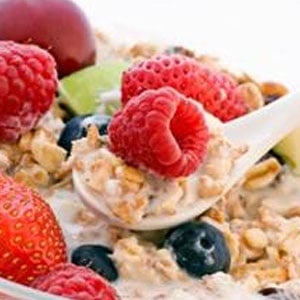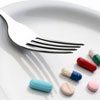
In this article, we take a close look at gastro-oesophageal reflux disease (GORD) and at the way in which diet may be able to alleviate the pain and discomfort associated with this condition.
A physiological defect
Although most people suffer from reflux of acid stomach contents (also known as heartburn) at some time or another, particularly when overindulging in rich foods and too much alcohol, some individuals are constantly plagued by acid from the stomach pushing up into the oesophagus.
This is caused by a defect in a valve or sphincter at the bottom end of the oesophagus that normally closes to prevent acid from the stomach pushing up into the oesophagus. If such a valve defect exists, the acid contents of the stomach will come into contact with the delicate lining of the oesophagus, causing damage.
In some cases, bile acids from the gall bladder may also enter the oesophagus (which is an alkaline part of the digestive tract), and cause corrosion of the sensitive tissues.
Symptoms of GORD
According to Isselbacher and coworkers (1980), heartburn is the most typical symptom of GORD, which can manifest as severe pain in the upper and other parts of the abdomen.
Episodes of heartburn tend to occur after meals, especially if the meal has been rich or too large. Body movements such as bending over, lying down or lifting heavy objects, that cause strain, may make the symptoms worse.
Some patients may experience reflux during sleep, which is potentially dangerous as "regurgitated" material may be breathed into the lungs.
Approximately 20% of patients with GORD may have such severe and constant inflammation of the sensitive tissues of the oesophagus that this can lead to cancerous changes and bleeding. Swallowing can be extremely painful and patients may stop eating, which may lead to malnutrition.
Treatment of GORD
If you suffer from persistent, recurrent and severe heartburn, you should have a medical examination to find out if you are suffering from GORD.
The doctor will prescribe the necessary medication(s), of which antacids are first on the list. Liquid antacids line the stomach and also protect the inside of the oesophagus from contact with abrasive acid material such as stomach contents or bile acids.
More severe, chronic GORD, which can lead to damage of the oesophagus, may be treated with medications called H2-antagonists and PPIs. If medical and dietary treatments do not improve the condition, surgery may be indicated.
Patients are often also advised to raise the top or head end of their bed while sleeping to prevent reflux during the night.
Dietary treatment in GORD
Patients with GORD should not eat large, heavy meals and are advised to have small, light meals at regular intervals.
Try splitting up your three standard daily meals into five smaller ones, for example:
Breakfast: Cereal with yoghurt and milky Rooibos tea
Mid-morning snack: Sandwich with cottage cheese or a boiled egg and milky Rooibos tea
Lunch: 30g portion of lean meat or fish or egg with fruit and cooked vegetables
Mid-afternoon snack: 2 biscuits or rusks with milky Rooibos tea
Supper: 50g lean meat or fish with rice and cooked vegetables Canned fruit with custard or yoghurt
Do not eat anything in the 3-4 hours before going to bed.
Patients with GORD must experiment to find out which foods they must avoid. This is usually an individual reaction – one patient can eat brown or wholewheat bread without suffering any ill effects, while the next patient can only eat white bread.
You may find that avoiding spicy foods and condiments, very acid foods, gassy cold drinks, excessive coffee and tea, and all alcohol, will improve your condition a great deal. Foods that cause build-up of gas that distends the stomach and forces acid up into the oesophagus may also cause distress.
Common gas-producing foods are:
- raw onions, garlic, shallots, leeks
- the entire cabbage family – cabbage, broccoli, Brussels sprouts, cauliflower, Chinese cabbage and red cabbage
- legumes (dry beans, peas, lentils, soya products)
If you are struggling to work out what you can, or cannot eat, ask your gastroenterologist to refer you to a clinical dietician, or visit the Association for Dietetics in SA website at www.adsa.org.za and click on "Find a Dietician" to find a dietician in your area.
The dietician will assist you with selecting those foods that you can eat without pain and discomfort and also monitor if your diet is still balanced. This is an important aspect of selecting foods for your GORD diet.
As some foods cause so much pain and discomfort, you may have to eliminate them from your diet. This, however, can cause deficiencies if you do not substitute other foods that also contain the missing nutrient(s). The dietician will assist you with the correct choices.
GORD and overweight
A number of recent studies indicate that people who are overweight or obese may be more susceptible to GORD.
One of the latest editions of the Arbor Clinical Updates (2006), reports on two studies that investigated the link between body weight and GORD. In an American study of more than 10000 female nurses, it was found that women who were overweight or obese were more likely to suffer from GORD and had more severe symptoms.
Another report indicates that overweight and obese patients not only suffered more frequently and severely from GORD, but that they were exposed to a higher risk of cancer of the oesophagus.
The best step for any patient with GORD, who is overweight or obese, is to try to lose weight. This will improve symptoms and outcomes. If you consult a clinical dietician, she or he will also help you to start losing weight.
In view of these new findings, anyone who suspects that he or she is suffering from GORD needs to go for a medical examination. If this condition is diagnosed, it is important to consult a clinical dietician. – (Dr Ingrid van Heerden, DietDoc, October 2006)
References:
(Isselbacher KJ et al (1980). Harrison's Principles of Internal Medicine.9th Edition.McGraw-Hill, New York; Arbor Clinical Nutrition Updates (2006). Heartburn, coffee, chocolate & spices. Issue 260, 2006).




 Publications
Publications
 Partners
Partners















